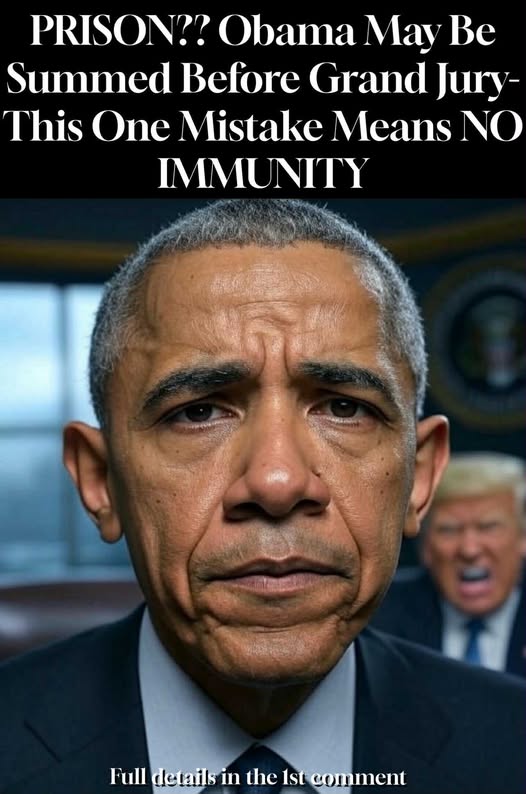
Former President Barack Obama may soon find himself facing an unprecedented legal challenge tied to the long-running controversy surrounding “Russiagate.” According to investigative journalist John Solomon, recent developments could allow Obama to be summoned before a grand jury, potentially compelling him to testify under oath about decisions made during his administration. Solomon claims that while presidential immunity largely protects former presidents from prosecution for official acts committed in office, the shield of immunity has an unexpected loophole. If Obama were to testify falsely as a private citizen, he could forfeit the very legal protections that once safeguarded him.
In a recent interview on Real America’s Voice, Solomon explained that the situation has evolved significantly. “Once summoned before a grand jury, President Obama would have no choice but to testify truthfully. He cannot invoke the Fifth Amendment because immunity has already been extended to cover his presidential conduct,” he said. “But if he lies—even once, even about a minor detail—that lie would be committed as a private citizen. From that moment on, his immunity could unravel.” According to Solomon, that is where the former president faces risk: not from what he did in office, but from how he might explain those actions now.
The controversy centers on a White House meeting held on January 5, 2017, just weeks before the end of Obama’s presidency. At the time, the FBI had reportedly closed its investigation into incoming National Security Adviser Michael Flynn, finding no evidence of wrongdoing. However, Solomon and other commentators allege that during that meeting, senior officials—including then-President Obama—discussed ways to re-engage Flynn, possibly by luring him into an interview where he might contradict himself. Such contradictions could then be used to charge him with making false statements, despite the earlier closure of the case.
Former FBI Director James Comey has openly acknowledged in past interviews that he played a role in arranging an interview with Flynn under unconventional circumstances. Documents released during Flynn’s legal battles appeared to support claims that officials sought to “catch him in a lie,” a strategy that critics now argue was both politically motivated and unethical. Flynn eventually pleaded guilty to lying to the FBI but later attempted to withdraw his plea, citing government misconduct. His case became one of the most contentious legal dramas of the Trump era.
Solomon now suggests that Obama himself may face a scenario eerily similar to the one his administration allegedly engineered for Flynn. “The irony here is profound,” Solomon remarked. “On January 5, 2017, Barack Obama was part of a meeting where officials brainstormed how to corner Mike Flynn. The idea was to put Flynn in a position where he might make a misstatement and lose his freedom. Now, Obama could find himself in the very same trap—compelled to answer questions under oath and risking everything if he fails to tell the truth.”
According to legal experts Solomon has spoken with, the ruling on presidential immunity does indeed shield Obama from prosecution for actions taken during his presidency. However, that immunity does not extend to perjury or obstruction committed after leaving office. If Obama testifies in a grand jury setting and his statements are later proven false, he could be exposed to legal consequences just like any private citizen.
The possibility has fueled heated debate among political commentators. Supporters of former President Donald Trump, who has frequently criticized the handling of the Flynn case and the broader Russia investigation, see this as a potential turning point. Trump himself has voiced frustration, insisting that Obama should be held accountable for what transpired in the final days of his presidency. Solomon echoed those sentiments, noting that Trump’s analysis of the situation “was right” in terms of immunity covering past acts but not future testimony.
Still, legal scholars caution that the likelihood of Obama actually being forced to testify remains uncertain. Much would depend on whether a grand jury deems his testimony necessary, and whether the Department of Justice or other authorities pursue the matter aggressively. Even then, compelling testimony from a former president would represent a highly unusual, possibly unprecedented, step in American legal history. Critics of Solomon’s interpretation also argue that presidential immunity is more robust than he suggests, and that the idea of Obama losing such protection may be overstated.
Nevertheless, the story underscores the lingering shadows of the Russia investigation, which dominated American political discourse for years. What began as a probe into possible ties between the Trump campaign and Russian interference eventually sprawled into a saga of accusations, counter-accusations, and bitter partisan battles. Michael Flynn’s ordeal was one of the most dramatic subplots, and even years later, it continues to reverberate through debates about justice, fairness, and political accountability.
For Obama, the situation remains hypothetical for now, but the conversation about his potential legal exposure has already reignited old divisions. To his critics, the notion that he could be called before a grand jury represents long-awaited accountability. To his defenders, it is yet another example of partisan efforts to tarnish a legacy they see as defined by stability and integrity. What is clear is that the questions surrounding January 2017 are not fading quietly into history.
As John Solomon emphasized, “If Obama tells the truth, his immunity stands. If he lies, he risks everything. That’s the very trap his own administration once used against Michael Flynn.” Whether or not events unfold in that way remains to be seen, but the possibility alone ensures that the debate over Russiagate—and the players at its center—will continue to stir controversy for years to come.
